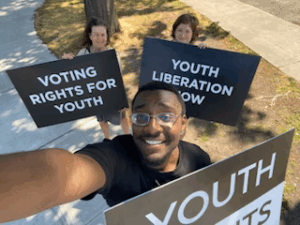A piece in the Barre Montpelier Times Argus was a breath of fresh air. Even if only an oped, it is still nice to see the pro-youth point of view being published. Let’s have a look at this, shall we?
The rights of young people have been in the news lately. In Montpelier, student posters decrying public indifference to Darfur were censored by school administrators. In Barre, young people have been warned they can be arrested – solely because of their age – if they venture out at night.
Right off the bat, we see two vomit-inducing strikes at innocent young people. For one, students are not allowed to publicly renounce genocide in school? That’s what this is. It’s not like the school admins saw it that way. They figured the students were riled up about something or other and wanted to silence them to keep from being annoyed. That’s one possibility. After all, students are the inferiors of the situation. They don’t matter, right?
And let’s not forget good old Barre. A curfew? Why, because a few residents were offended and scared at the idea of those “horrible” young people being outside at night doing horrible things? Oh, right, they made up some junk about it being in place to prevent crime. After all, everyone knows teens out at night can only be out to destroy property or rape someone. Or is it to protect teens from being mugged or raped? These people need to make up their minds. In any case, we have yet another town enacting a curfew, the feel-good band-aid to cover up a municipality’s real problems and blame a scapegoat. That’ll get your votes!
To think these things are happening in perhaps the most freedom loving state of the union is even more disturbing!
In both instances, adults made decisions that may violate constitutional freedoms.
That’s about the size of it.
Concerning the Montpelier High School issue, there are important U.S. Supreme Court decisions that protect students’ rights of political expression. The most famous is the case Tinker v. Des Moines School District. A 13-year-old student, Mary Beth Tinker, wore a black armband to school to protest the Vietnam War. For her action, school officials suspended her. She went to court to fight the suspension. The case went all the way to the Supreme Court, which ruled in her favor.
The justices wrote that students don’t “shed their constitutional rights to freedom of speech or expression at the schoolhouse gate.” Only if student speech “materially and substantially interfere(s) with the requirements of appropriate discipline in the operation of the school…colliding with the rights of others” can student speech be censored, the court said.
There have been several other Supreme Court cases testing the limits of the Tinker decision. One, Hazelwood School District v. Kuhlmeier, said administrators can censor school-sponsored student publications under certain conditions. Another said that student speech that is vulgar, lewd, indecent, or plainly offensive is also not immune from censorship (this case didn’t deal with political speech, however, but with personal remarks made by a student).
Montpelier administrators justified their censorship of students’ Darfur posters on the speculation that some students might find them “offensive.” However, as the ACLU-Vermont showed in a recent case involving a Williamstown student before the Second Circuit U.S. Court of Appeals, “offensive” cannot be used as a blank check to censor student speech someone may not like. Further, a 1982 Supreme Court case noted that “students’ rights to freedom of expression of their political views could not be abridged by reliance upon an ‘undifferentiated fear or apprehension of disturbance’ arising from such expression.”
Oh, sure, offensive. When you can’t find any possible reason for shutting someone up, seeing as it’s only because you personally don’t like young people talking about heavy issues which adults happily ignore, you play the offensive card. I guess it’s true. School admins were offended that students, who are supposed to be stupid and apathetic and uninformed, are showing they care about something real.
The Barre curfew seeks to prohibit citizens under the age of 16 from being out between the hours of 10 p.m. and 5 a.m. There are certain exceptions — for school activities or work, for example. These exceptions, however, may not get the Barre ordinance past several court decisions finding curfews unconstitutional.
Oh, we can only hope. Funny really. This essentially means kids can only be outside for activities that the city has deemed innocent. So this means only adults can be outside for ill purposes. Only adults are allowed to commit crimes. Good to know.
Some of these decisions have noted that parents, not the state, have the right to determine their children’s activities. A parent may tell a child to be home by 10 p.m.; that’s a parent’s role in child-rearing. But the state doesn’t have the right to prohibit a youngster who is otherwise not breaking the law from being out at night. Not only does this take away parents’ rights to raise children as they see fit, but it discriminates against an individual sheerly on the basis of age – not on the conduct (legal/illegal) one is engaged in.
Not only infringing on the rights of youth but also on permissive parents. Curfew supporters love to go on and on about how curfews are needed because parents aren’t keeping their kids inside like they’re supposed to, so a curfew would help the parents control their kids. They seem to be ignoring the little fact that not all parents are the same! Or, more likely, making up ridiculous excuses for an extremely illogical idea.
Courts’ interpretations of government’s authority to infringe on individual rights change. That’s especially true with the current U.S. Supreme Court. If the Supreme Court rules in favor of school officials in the recent “Bong Hits for Jesus” case, for example, Montpelier administrators may have firmer ground to censor student speech. But under current law, student free speech rights should be respected.
It is a precarious situation we’re in with the Bong Hits 4 Jesus case, and we’re looking at some dark days if the school does win it. Even those who are at best neutral on the subject of students’ rights should see how over the line that is. Then again, I’m probably being too optimistic. Sigh.
And parents should be the ones to determine when their children are out at night. We welcome complaints from families who feel the Barre curfew is unfair. We believe the curfew may not withstand court scrutiny.
May their complaints ring loud, loud enough to hopefully drown out the sensationalist media preaching the inherent terror of a free teenager.
May all of our complaints ring loud. These two scenarios are only two of a dizzyingly high volume of anti-youth stories all across the nation every day. We can’t ignore them. We can’t surrender to them. It’s not right. We know it’s not right. Why are we so silent about it and afraid to speak up? Politicians see teens as the disenfranchised property of their parents, and take their rights away left and right in the name of protection, as they watch the votes from ignorant, appeased parents pour in. It’s disgusting and it has to stop.





